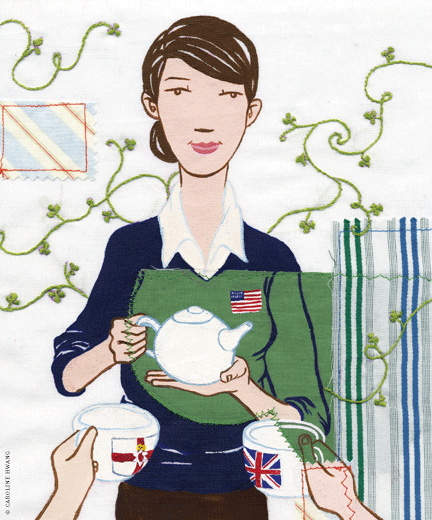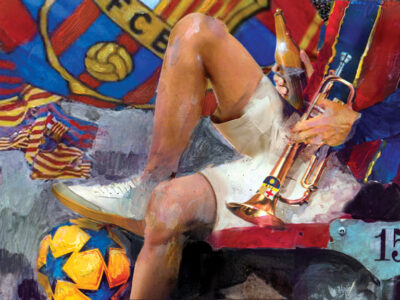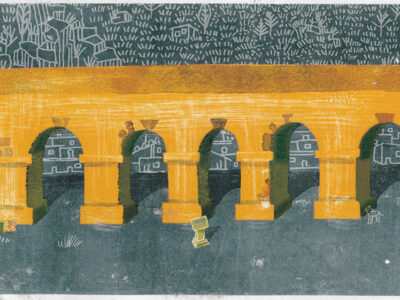
The strange familiarity of divided Belfast.
By Martha Cooney
We sat in a council meeting room just outside Belfast: requisite tea tray on the table, notebooks out, seven sets of eyes on me. The circumstance seemed minor. There was a territorial and financial overlap between two community-development projects, and the nonprofit I worked for had assembled the leaders of two local groups in an effort to use grant money more effectively. Sounds easy, until the details: one group was Protestant, one Catholic. Despite living within the same housing estate, neither side had any relationship with the other.
I was the neutral party, required to get everyone around the table to join forces.
This kind of diplomacy hadn’t really figured in my job description, but in Belfast, where sectarian divisions permeate every aspect of life, it was inevitable. The meeting represented larger divisions that still persist in Northern Ireland, long-lasting shock waves from the Troubles that the city is endlessly trying to shake off. My role as an American interloper was to slip unnoticed between the two sides. My own Irish Catholic background did not seem to matter. Writing in American underneath the Catholic box I had to tick on job applications—or sometimes ignoring the boxes altogether—I went ahead with my mouth shut, allowed into the complicated psyche of both sides of Northern Ireland.
My first three months in the city had given me a crash course in the unwritten rules of the Belfast social code. Words and phrases were a giveaway of either Protestantism or Catholicism—starting with the matter of what to call the place we lived in. “Northern Ireland,” I was corrected with a half-joking, half-not tone by one of my Protestant coworkers when I made the mistake of calling it just Ireland. Among other acquaintances, however, it would have been offensive to say we were in the United Kingdom. Even names like region, the six counties, the province, and Ulster all had different connotations that belied your sympathies.
Sometimes I felt like I was on a game show, guessing at someone’s identity in order to pick the appropriate phrase. But it wasn’t the first time I had experienced this chameleon sensation. In a way, it was like being at Penn all over again.
I didn’t have to drive very far to get from my childhood home to my freshman room in Hill House. But the journey from Northeast Philadelphia to the Penn campus was like traveling to another universe. There were brands and styles I’d never heard of (North Face, Lacoste, J. Crew pants with small animals on them), foods I’d never tasted (sushi, naan, portobello mushrooms), and entire conversations that revolved around words that meant nothing to me (Vail, Phillips Exeter, consulting). Chalking it up to my family’s humble background didn’t make things much easier, especially since I considered myself more privileged than plenty of other people in the city. Entering a classroom full of students wearing suits, heels, and pearls was confusing. Was I crazy, sitting there in my sweatpants, or were they? Meanwhile, I would meet girls whose impeccable diction was the result of voice coaches hired to train away their hometown accents—Philadelphia accents, in fact. Cash seemed to flow endlessly. The price of a new laptop clearly had not bothered the guy in our hall who threw his computer against the wall before jumping up and down on it in a fit of frustration. (Engineering students from another floor scrambled to grab the pieces.)
And undergraduate notions about Northeast Philly showed that the incomprehension went both ways. “I hear that’s kind of ghetto,” I remember someone telling me when I named my home. He sure must have been from out of town. Most Philadelphians would have rolled their eyes at me for hailing from the area reputed to be the most ignorant, the most white, and the least tough in town.
Community work at Penn brought its own frustrations. Well-meaning students were always sweeping in to save West Philadelphia with their research-based academic service projects, or romanticizing “this amazing, really AMAZING” welfare recipient they had encountered. Despite our joint devotion to common causes, I couldn’t help but feel a gap separating me from other students. Once, in a political science class that focused on poverty, we worked with a community organization to plan a dinner at the home of a family in Northeast Philadelphia. The familiarity of the houses, the layout of the block—it all felt so normal and homey to me as we neared our destination. In fact, we were on a street five minutes from my first childhood home. Yet for my Penn friends it was foreign territory. Afterwards, one girl marveled at the openness of the family members who had hugged her goodbye; she was not used to that kind of warmth, she said, even in her own family. It was like other students were learning a new language I already knew—but it still ended up sounding foreign to my ears.
Eventually I cracked the code, and figured out how to slip across the dividing line when it gave me an advantage. I became an expert at dangling my new Penn-ness in front of the noses of potential employers. I worked out when to put the dropped g’s back onto the end of my gerunds, when to avoid the iconic Philly Yo! But mostly I found safety in silence. I didn’t want to be shut out of either world, but I didn’t want to be boxed in either.
In Belfast it was the same for me; I had the privilege of easing in and out of both sides. The difference was that in Northern Ireland, the stakes were higher. People here don’t have the option to break out of their identity. It’s something they can never get away from.
For one of my Catholic friends, driving through East Belfast was a strange experience; she had never been there in her life. Panic spread among the family I was staying with when riots kicked off in their sleepy seaside town, where a bar was invaded and a carjacked vehicle set on fire, smoke billowing against green hills patrolled by grazing sheep. There were frantic calls warning everyone to lock their doors.
As time went on I realized that I was not immune. Neutrality was impossible. Running an errand in the Sandy Row estate—whose Protestant residents have emblazoned their domain with the red, white, and blue of the Union Jack—I fretted that I must be sticking out.
Being Irish Catholic had been a central part of my identity my whole life. I’d attended Catholic elementary school and high school, and held down summer jobs at a Catholic-run camp. Both of my parents worked for the Archdiocese of Philadelphia. After spending a college semester in Dublin, I brought home a huge tricolor that hung in my room. But in Belfast, both the British and the Irish colors sparked anxiety whenever I saw them. What’s more, the Catholic neighborhoods had started to fill me with more tension than the Protestant sections where I mostly worked. Had I absorbed the mentality of a side that wasn’t even “mine”? Or was it the constant back-and-forth that brought about a feeling of never completely belonging? Once again I found myself taking shelter in silence—only this time it was a part of the cultural code. As Seamus Heaney put it: The famous/Northern reticence, the tight gag of place/and times. Where to be saved you only must save face/And whatever you say, you say nothing.
The stifling feeling Heaney described settled around our council meeting table, where for once it was my responsibility to speak up. I had to create a space where people could make headway on the issues at hand. I awkwardly opened the floor and people started to talk. There were introductions, questions about what the other group was doing, and slowly, efforts to break out of the long habit of being neighbors without being neighborly. The tension wasn’t going to fade away entirely, and trust was going to be halting and hesitant, but they were getting somewhere. I started to breathe more easily, easing into the comfort of neutrality as the groups figured out a plan to work together.
I’ll be returning this year to Belfast, and the game of navigating a divided culture. Part of me wants to show more of a voice, but the same caution I felt during my undergraduate years has not disappeared, and slipping into my armor of safety still feels appealing. I know it can’t last forever. When you can partway belong in any place, you never fully belong anywhere. But for now I am content, even if it is the contentment of a stringless balloon: floating along with others but tied tight to no one.
Martha Cooney C’05 is a writer currently living in Belfast, where she is working on a children’s novel. Contact her at [email protected].




